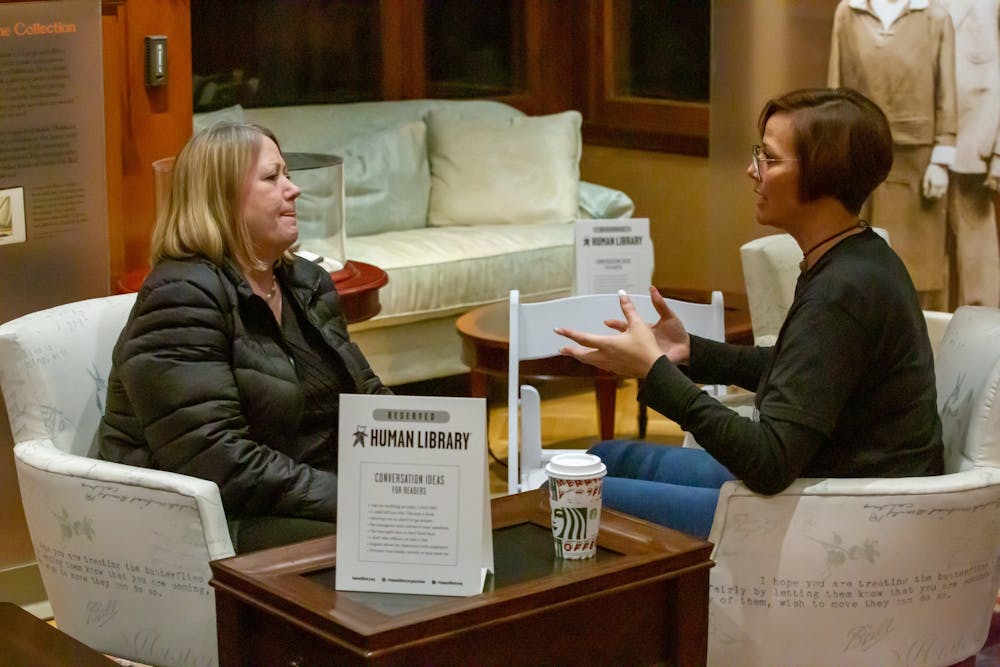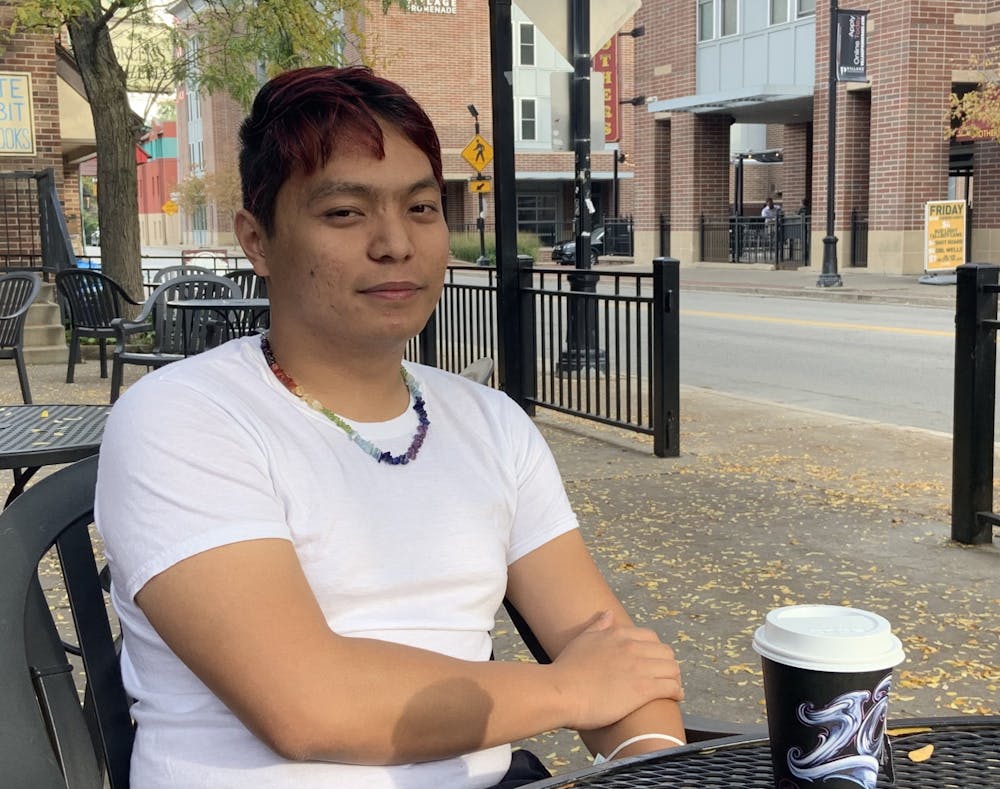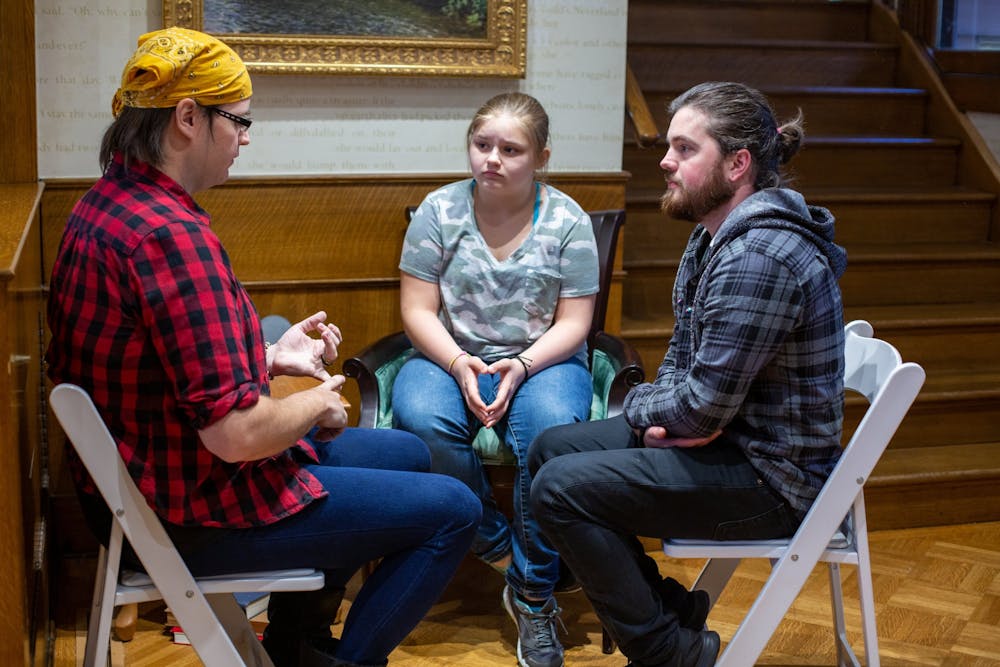To apply to become a librarian or a “book” at the Human Library, visit its website humanlibrary.org.
The Prequel
Founded in Copenhagen, Denmark, Ronnie Abergel created the Human Library to help challenge the stigma of difficult topics by simply creating discussion between people.
Created in 2000, the Human Library was a small-scale group operating solely out of Denmark. Twenty-one years later, the organization has branches in 85 countries and counting. The Human Library has four well-established branches in the United States, and two of them are located in Indiana — one in Fort Wayne and the other in Muncie. The other two are located in Los Angeles and New York City.
The Human Library uses “library language” in order to keep its theme and structure alive. The Human Library in Muncie consists of many “books,” who are volunteers who come into the library to represent a topic that directly relates to or describes them, such as depression, police officer, survivor of abuse and transgender. Librarians at the Human Library help train the “books” and organize readings within the community.
The “readers” are people who come to library events or readings. They may come with questions prepared for specific books or just attend to learn something new. Although most of their meetings occur via Zoom, they occasionally meet at Minnetrista in their Oakhurst Gardens.
Making an Impact
Peggy Lewis, librarian for the Muncie branch, has been involved with the organization since 2018. Lewis works as a branch manager both in Muncie and in a global group that meets twice a week via Zoom.
“I have a lot of books here,” Lewis said, “and I’d like to say that ours are kind of homegrown books, and it’s very organic.”
To recruit new books and spread the word about the Human Library in the Muncie community, Lewis said most of its advertising is done by word of mouth. She said her goal when volunteering for the Human Library is to give herself and the “books” a chance to grow and create an impact.
“Our human books are very transparent,” Lewis said. “They’re very courageous and brave and, if the reader is courageous and brave also, they’re going to get a lot of new information. It’s a place where we can begin to break down prejudices, biases and stereotypes and create an understanding.”

Lewis said she believes most of the stigma surrounding difficult topics the Human Library’s books represent come from fear, but the best way to overcome that fear is to talk about topics that are often misunderstood.
“If you take a look at some of the Middle Eastern and Eastern countries, many of our topics are either illegal or taboo,” Lewis said. “We’re being invited to come to places like that to help and to educate.”
Every now and then, Lewis said she finds herself in the right place at the right time, with the right people. Lewis said she found one of the organization's “books” at a gas station where she came across a K-9 police officer who did not fit the “typical” profile of a police officer.
“I happened to be pumping gas one day,” Lewis said, “and I was across the pump from her, and I first noticed her police car. I just walked around the pump and I said, ‘This is going to be totally random,’ and I explained what I do [for the Human Library]. Probably only three sentences in, [the police officer] said, ‘I can do that.’ That’s how you meet people — in lots of different ways.”
The Human Library has a booth at many of Muncie’s community events such as First Thursdays, farmers markets and the Old Washington Street Festival.
“I stand out there with my brochures, and I hand them out to as many people as I can and tell them about the group,” Lewis said.
A New Direction
After coming across Lewis and her Human Library booth in 2019 at a yard art (YART) event, Ian Gonzales found the purpose he had been searching for. Gonzales studied education at Ball State, but when he graduated in 2019, he said he was in need of something new after things didn’t turn out the way he expected.
“I was an educator for a bit, but I didn’t do too well in education, so I left,” Gonzales said. “I just wanted to have direction in my life, so I decided I would start saying ‘Yes’ to everything and anything.”
When Lewis asked Gonzales if he was interested in becoming a “book” for the Human Library, he agreed.
“[After] we started training and had our first event, it really had an impact on me,” Gonzales said. “I really enjoyed it and wanted to keep going at it and now, here we are — two years later.”
When Gonzales first joined the Human Library, he was unsure about the title he was going to represent, but a consultation with Lewis and Abergel helped aid his decision.
“My initial title was ‘double minority’ or something like that because I’m a gay man, and I’m an Asian,” Gonzales said. “When Ronnie came in, he said that I should just focus on one and the other one will come eventually.”

Because there were already other queer “books” in the library at the time, it was clear to Gonzales what story he needed to tell.
After deciding to represent the title of “Asian American,” Gonzales said most of his conversations focused on how his title became a political topic due to the COVID-19 pandemic. He said most of the people who come to public reading events aren't aware Asian Americans face racism as often as African American or Latino people.
“How do you have someone in your life who’s Asian American and don’t believe there’s any discrimination against Asian people in this country at all?” Gonzales said. “That’s why I like to keep publishing under [the title].”
Gonzales said it’s a slightly different experience each time he tells his story. Because the goal of all the books is to give the reader what they want, every reader brings something different. He said while there is no true way to train for having a conversation with someone as a “book,” a good conversation will come through as long as a “book” is comfortable with their story.
Sharing the Passion
Diane Bottomley, associate professor of elementary education, first heard about the Human Library in 2019 from her close friend and then-coworker Lewis.
“Peg was so passionate and involved,” Bottomley said. “I’m always there for her, so when she said, ‘I need some help [in the library], I’m like, ‘Sure.’”
Bottomley, like Lewis, is a librarian who helps with social events to welcome readers, train new books and recruit new members. Bottomley said the Human Library holds picnics for the “books” as a way to thank and appreciate them for their time and hard work.
As a professor, Bottomley realized she could use the Human Library to connect with and educate her students in a new way.
“We have a diversity theme in our program, and one option for that assignment is to attend a Human Library event,” Bottomley said. “[Students] then write a reflection about it and have to think about how this has an impact on them as a future educator.”
According to feedback from some of her students, Bottomley said the assignment helps them learn skills they can use in their future careers through empathy and creating lasting connections. She said certain “books” are able to offer valuable insight to her students.
“Seeing the impact [the Human Library] has had on my students is what makes it all worthwhile,” Bottomley said. “I think they buy into it because of my passion.”
Volunteering for the Human Library has helped her both in her career and as a person, Bottomley said, as she truly resonates with the organization’s goal .
“It has helped me grow, and I think I became a better professor and teacher by being more accepting and understanding,” Bottomley said. “I think a lot of our unclaimed or unknown biases and prejudices happen because we just haven’t encountered somebody who has a different pillar. That’s what the Human Library is about, just exposure and understanding.”
Contact Grace Duerksen with comments at gvduerksen@bsu.edu or on Twitter @gracie_duerk.





